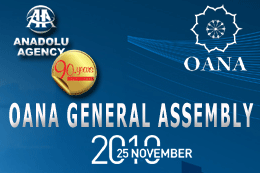German prosecutors initiated legal proceedings against a charity established by Turks living in Europe. Deniz Feneri e.V. (Lighthouse e.V.) allegedly channeled donations made in Germany to private corporations in Turkey owned by close allies of the AKP. When these reports first emerged, it triggered controversy, since media outlets in the Dogan Media Group questioned the involvement of AKP supporters and the government’s silence over allegations of corruption (EDM, September 11, 2008; February 20).
The German court requested judicial assistance from the Turkish authorities concerning several individuals, including Akman, for their involvement in the case. The German investigation identified Akman “as the shareholder and executive of three companies in Germany. The German authorities also documented that Akman was the executive of a German-based cooperative, into which another investigation was launched because of fraudulent activities” (Hurriyet Daily News, June 8).
The opposition and other critics of the AKP accused the government of stalling the investigation into the Turkish side of the Lighthouse case, by using various delaying tactics. They speculated that there might be evidence contained within the dossier sent by the German court establishing links between the Lighthouse case and officials close to Erdogan. If the money transferred to Turkey was used to finance the AKP’s activities, it might have serious political repercussions within the country. Since the Turkish constitution prohibits political parties from receiving funds from foreign countries or organizations, such links might result in another closure case being instigated against the governing AKP (Hurriyet, May 14; Hurriyet Daily News, June 3).
Although Akman has been the subject of a parliamentary inquiry, and a court case was filed to overthrow him, he has remained defiant (ANKA, May 12). Finally, Arinc said that he had asked Akman to resign during a private meeting, in order to avoid any damage to the RTUK. He added that Akman had agreed (www.haberturk.com, May 21). Arinc is one of the leading figures within the AKP and is known for his strong stance against corruption. Since he was appointed as the deputy prime minister during the last cabinet reshuffle, he has stressed his commitment to pursuing an ethical approach to politics. As the state minister, Arinc also oversees the RTUK.
Arinc’s statements were welcomed by other members of the AKP government as well as the speaker of the Turkish parliament Koksal Toptan (www.cnnturk.com 22 May). The cabinet speaker Cemil Cicek even implied that Akman could have been asked to resign by the prime minister -prior to Arinc’s request (www.haberturk.com, May 25).
After one week of silence, Akman spoke to Haberturk in an effort to clear his name. He said he was not asked by Arinc to resign; Arinc only inquired as to “whether he was considering resigning.” Akman refused saying that stepping down would have been perceived as an acknowledgement of guilt. He maintained that the allegations are being used to weaken the RTUK’s reputation. He added that he will remain in his post until his tenure ends on July 14, and he will not seek any extension. Finally, he challenged those “who were seeking to undermine his reputation” and said that “at the right moment,” he will respond to these allegations (www.haberturk.com, May 30).
Although Haberturk reported that Akman claimed he enjoyed the firm backing of the Prime Minister Recep Tayyip Erdogan, his lawyer denied this (Anadolu Ajansi, May 29). In the meantime, as part of the Turkish investigation, an Ankara court issued precautionary measures against the properties of Akman and other individuals. Responding to a question on these developments, Erdogan said that he was not in a position to defend Akman. “He has continued to defend himself very well and will continue to do so,” Erdogan added (Anadolu Ajansi, June 6).
On June 6 Arinc repeated his call for Akman’s resignation. He added that he had no authority to remove the RTUK chief because he is appointed by parliament -nor can he be removed by Erdogan. He also emphasized that no AKP member was implicated in the fraud case. Later, Erdogan reacted harshly to speculation that the money from Lighthouse was funneled to the AKP (Anadolu Ajansi, June 6 and June 9).
The opposition parties, however, did not find the government’s arguments convincing. They believe that the government has failed to adequately address the issue. One CHP representative, Kemal Kilicdaroglu, known for previously publicizing corruption cases involving AKP members, asked Arinc to resign, arguing that it was shameful that a minister was unable to command a bureaucrat under his authority (Anadolu Ajansi, June 1). Moreover, the CHP leader Deniz Baykal, accused the government of failing to force Akman to resign, and argued that the government’s delay had provided an opportunity for Akman to conceal evidence (Taraf, June 8).
Depending on the progress of the current case, tensions within Turkish politics might increase. The opposition parties will continue to press the government to take action against Akman and the corruption allegations, since such high profile cases allows them to weaken the AKP’s popularity. As Akman struggles to clear his name and leave office with an unblemished record, the AKP will have to protect its image as a corruption-free party -perhaps ultimately by sacrificing Akman.


